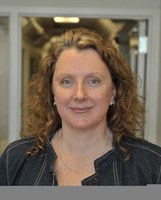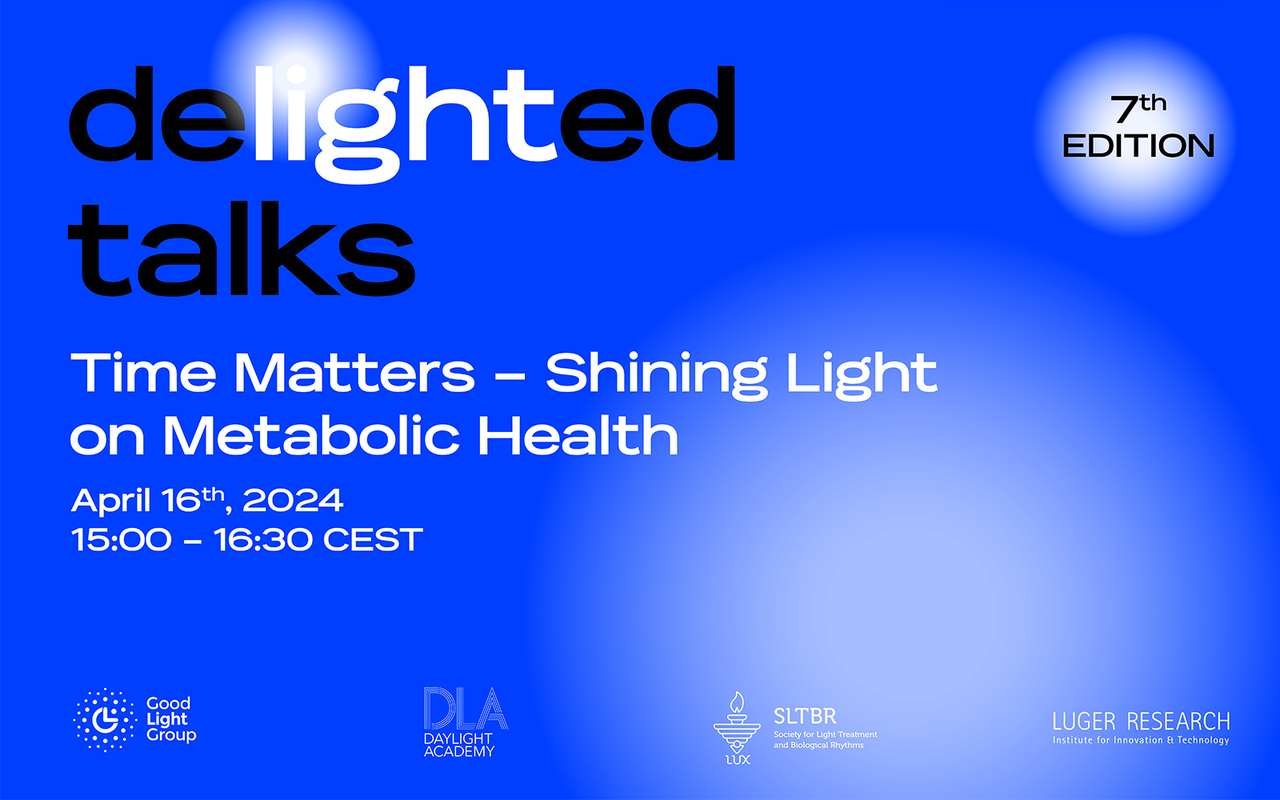Time Matters – Shining Light on Metabolic Health
The Good Light Group, together with the Society for Light Treatment and Biological Rhythms (SLTBR), the Daylight Academy (DLA), and Luger Research (LR), are organizing and presenting the “deLIGHTed Talks” lectures (7th Edition).
15.00 Introduction
Welcome, Introduction by Charna Dibner, Geneva University
15.10 From the Real World to the Lab: Why Light Matters for Metabolic Health
by Kathryn Reid, Northwestern University
15:30 Diabetes in the Daylight: Metabolic Benefits Through Natural Office Lighting?
by Jan-Frieder Harmsen, RTWH Aachen University
15:50 Panel Discussion
Including Q&A with the Audience
Panelists: Kathryn Reid & Jan-Frieder Harmse
Moderation: Charna Dinner
Register Now / Free Registration
Moderator: Dr. Charna Dibner  Charna Dibner completed her PhD in Medical Sciences under the supervision of Professor Dale Frank in the Department of Biochemistry at the Technion Israel Institute of Technology, headed by Nobel Laureate Professor Avram Hershko. She next moved to Geneva where she completed her postdoctoral training at the Faculty of Science, University of Geneva, with Professor Ueli Schibler, working on the mechanisms of transcriptional and temperature compensation of the mammalian circadian clocks. In 2009, she was appointed as a Group Leader of the Laboratory of Circadian Endocrinology at the Faculty of Medicine, acquired her Private Docent degree, and was nominated Associate Professor in 2021. Her work centers upon the implication of circadian oscillators in regulation of metabolic processes in mammals. In particular, she is interested in intricate interplay between the islet cellular clocks, and in the inter-organ desynchrony upon metabolic diseases, unraveling the roles of the circadian clocks in human metabolic diseases. Charna's work has been awarded with several prestigious Swiss prizes including Roche Research Foundation prize, Takeda prize for diabetes research, the awards by French Swiss Foundation of Diabetes Research, and Leenaards and ISREC Foundation awards for translational research.
Charna Dibner completed her PhD in Medical Sciences under the supervision of Professor Dale Frank in the Department of Biochemistry at the Technion Israel Institute of Technology, headed by Nobel Laureate Professor Avram Hershko. She next moved to Geneva where she completed her postdoctoral training at the Faculty of Science, University of Geneva, with Professor Ueli Schibler, working on the mechanisms of transcriptional and temperature compensation of the mammalian circadian clocks. In 2009, she was appointed as a Group Leader of the Laboratory of Circadian Endocrinology at the Faculty of Medicine, acquired her Private Docent degree, and was nominated Associate Professor in 2021. Her work centers upon the implication of circadian oscillators in regulation of metabolic processes in mammals. In particular, she is interested in intricate interplay between the islet cellular clocks, and in the inter-organ desynchrony upon metabolic diseases, unraveling the roles of the circadian clocks in human metabolic diseases. Charna's work has been awarded with several prestigious Swiss prizes including Roche Research Foundation prize, Takeda prize for diabetes research, the awards by French Swiss Foundation of Diabetes Research, and Leenaards and ISREC Foundation awards for translational research.
Speaker: Dr. Kathryn Reid
"From the Real World to the Lab: Why Light Matters for Metabolic Health" Dr. Reid is a Research Professor at Northwestern University Feinberg School of Medicine in the Division of Sleep Medicine and is Associate Director of the Circadian Rhythms and Sleep Research Program. She is also faculty in the Center for Circadian and Sleep Medicine, Center for Sleep and Circadian Biology, and the Transportation Center at Northwestern University. Dr. Reid completed her PhD in Medicine in 1998 at The University of Adelaide and moved from Australia to the USA that same year. Her current research examines the effects of circadian disruption, sleep and light exposure on performance, safety and the impact on metabolic and cardiovascular health. Her work related to the impact of light on health, spans from population-based observational research to field-based light interventions and detailed physiological studies of light manipulation within the laboratory setting.
Dr. Reid is a Research Professor at Northwestern University Feinberg School of Medicine in the Division of Sleep Medicine and is Associate Director of the Circadian Rhythms and Sleep Research Program. She is also faculty in the Center for Circadian and Sleep Medicine, Center for Sleep and Circadian Biology, and the Transportation Center at Northwestern University. Dr. Reid completed her PhD in Medicine in 1998 at The University of Adelaide and moved from Australia to the USA that same year. Her current research examines the effects of circadian disruption, sleep and light exposure on performance, safety and the impact on metabolic and cardiovascular health. Her work related to the impact of light on health, spans from population-based observational research to field-based light interventions and detailed physiological studies of light manipulation within the laboratory setting.
Lecture: The impact of light is dependent on when it occurs relative to the internal biological clock, and as such the timing of when we get light or dark across 24-hours matters. Light exposure patterns are a modifiable factor that can have significant impact on health and wellbeing. Results from real world and laboratory-controlled studies that examine the impact of light exposure on health will be discussed. From pregnant women to older adults, data from real-world monitoring of light levels suggests that higher levels of light exposure in the few hours before and during sleep are associated with poor metabolic health. The mechanism underlying these findings are supported by controlled laboratory-based studies examining the impact of light on cardio-metabolic function. Together these studies suggest that interventions to optimize the pattern of light-dark exposure across the 24-hour day could be beneficial to health in vulnerable populations.
Speaker: Dr. Jan-Frieder Harmsen
"Diabetes in the Daylight: Metabolic Benefits Through Natural Office Lighting?" From 2012 to 2019, Dr. Jan-Frieder Harmsen studied exercise science and physiology at the German Sport University Cologne. Afterwards he started his PhD at Maastricht University to investigate the impact of the biological clock on metabolic health, particularly skeletal muscle metabolism, with a focus on insulin resistance and type 2 diabetes. Since shift work has been associated with a greater risk for metabolic disorders, he strives to better understand the impact of the biological clock on metabolic health and its relevance in the aetiology of type 2 diabetes. In this context, he studies how the benefits of lifestyle interventions can potentially be maximized by optimizing the timing of administration. In one study, he for example demonstrated that light intensity exerts differential thermophysiologic and metabolic effects depending on the time of day. Since 2023, he is working as a postdoctoral researcher in the Healthy Living Spaces Lab at the University Hospital at RTWH Aachen University to investigate how environmental time cues, such as light, can be exploited at the workplace to prevent metabolic disorders in the long-term. Next to his research, he is also hosting his own science podcast (www.247muscle.com) with the aim to provide translation of research in the field of skeletal muscle physiology, chronobiology, sleep, exercise performance & more to the interested public.
From 2012 to 2019, Dr. Jan-Frieder Harmsen studied exercise science and physiology at the German Sport University Cologne. Afterwards he started his PhD at Maastricht University to investigate the impact of the biological clock on metabolic health, particularly skeletal muscle metabolism, with a focus on insulin resistance and type 2 diabetes. Since shift work has been associated with a greater risk for metabolic disorders, he strives to better understand the impact of the biological clock on metabolic health and its relevance in the aetiology of type 2 diabetes. In this context, he studies how the benefits of lifestyle interventions can potentially be maximized by optimizing the timing of administration. In one study, he for example demonstrated that light intensity exerts differential thermophysiologic and metabolic effects depending on the time of day. Since 2023, he is working as a postdoctoral researcher in the Healthy Living Spaces Lab at the University Hospital at RTWH Aachen University to investigate how environmental time cues, such as light, can be exploited at the workplace to prevent metabolic disorders in the long-term. Next to his research, he is also hosting his own science podcast (www.247muscle.com) with the aim to provide translation of research in the field of skeletal muscle physiology, chronobiology, sleep, exercise performance & more to the interested public.
LECTURE: He will talk about a recently completed study, in which he tested if natural daylight during office hours is more beneficial for metabolic health outcomes of type 2 diabetes patients compared to constant artificial lighting.
Register Now / Free Registration
© 2024 Luger Research e.U. – Institute for Innovation & Technology

